
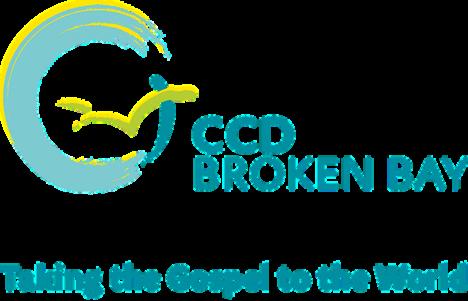











ALISON NEWELL
Head of CCD Broken Bay
P:83791637
E:alisonnewell@bbcatholicorgau
MARICEL MALAPIRA
CCD Compliance Officer
P:83791638
E:maricelmalapira@bbcatholicorgau
KRISTY KOMADINA
North Shore Region
P:83791674
E:kristykomadina@bbcatholicorgau
SUE-ANNE SHERWOOD
Northern Beaches Region
P:83791639



AE:sueannesherwood@bbcatholicorgau
JOHN DONNELLY
North Shore Region
P:83791640
E:john.donnelly@bbcatholic.org.au
MICHAEL TEBBUTT
Central Coast Region
P:83791641
E:michaeltebbutt@bbcatholicorgau
ALICIA KLEIN
CCD Compliance Officer
P:83791642
E:aliciaklein@bbcatholicorgau
Registrations for CCD Training
P:83791643
E:registrations@bbcatholicorgau
WWJ Curriculum Resources
P:83791642
E:ccdresources@bbcatholicorgau

s I write this, catechists are completing their SRE lessons for Term 2 and looking forward, I’m sure, to a well-earned winter break from teaching. At the halfway point of the year, I’d like to say thank you for your commitment and dedication to our ministry which serves the families of 10,000 Catholic children across the Diocese of Broken Bay
The theme of our Connections magazine this term is Sacraments Conscious that the Ministries of SRE and Sacramental preparation are so closely linked, we thought it might provide an opportunity to see how these two key children’s ministries might collaborate more closely at a parish level. I know many parishes already do this very well The percentage of children from public schools who are included in parish Sacramental programs in the diocese has grown
Interestingly, the National CCD has a particular interest in this space of Sacramental preparation In most of the States in Australia, this might be the only opportunity for parishes to connect with students and families whose children do not attend Catholic schools. For us in New South Wales, we can make these connections both through our Ministry of SRE and through the Parish Based, Family Centred, School Supported Sacramental Programs
When parents enrol for SRE classes, they do so through the school enrolment form The fact that they select Catholic SRE for their children when there are other choices, to me indicates that either they are a practicing Catholic family who want support in raising their children in the faith tradition of their families, or that a flicker of faith is burning in a parent’s heart, and they seek support from the parish through the SRE program to have that faith passed onto their children Some may not even realise why, but they tick the box anyway
When parents present their children to a parish for Sacramental preparation, this might require more discernment than ticking a box on a school enrolment form for something to take place during school time. When parents present to the parish asking for Baptism, Confirmation, Reconciliation and Eucharist, for me there is an indication that they want their children to be engaged in the Sacramental life of the Church; even if they don’t use this religious language to name it or even if it’s to get them into a Catholic school – something about the Catholic community has awakened their desire to participate
Sometimes we think because Catholic families are not members of our worshipping communities, that there is nothing Christian happening in their homes Many years of religious education and catechesis has taught me otherwise


I like to think that Catholic families who present their children for the Sacraments in the parish have been preparing their children to receive the Sacraments since the day they were born The family home as the domestic church is where children learn love, forgiveness, compassion, mercy and hope. It’s where they might pray and give thanks for their families It’s where they learn to reach out to the poor through Vinnies, through the local shopping centre Christmas appeal, and it’s where they learn to belong
When parents bring their children to the parish for Sacramental preparation, they commit to wanting to continue the faith journey of their children. This is our opportunity to catechise the children and their parents. Let’s recognise what the parents are already doing and encourage them to name why they do what they do Why do they love their kids Why do they teach them to share Why does the family give to winter and Christmas appeals, why do they model forgiveness to family and friends Why do they serve their neighbours and communities? We are not starting from scratch when we work with families for Sacramental preparation. Let’s help and encourage them to bring Christ into the lived experience of their home lives. We know God already exists in that space Let’s remind them and encourage them in the practice of that faith at home and to name why we do what we do as Catholic disciples of Jesus And, of course, let’s invite them to our Sunday liturgies so they can offer all they are to God and the broader parish community Remind them that we are Church together
Some of us are SRE and Sacramental catechists, so it’s easy to align the two ministries and see the commonalities that exist in the children’s ministry space I’m sure the SRE Catechist Coordinator and the Sacramental Coordinator in your parish are collaborating to ensure that Catholic children in public schools are included in Sacramental programs
For those of us who are SRE catechists alone, it’s i can support the Parish Based, Family Centred, Sch Program in the parish Find out when the Sacrame the parish and plan your SRE lessons to ensur teaching of the Sacramental units in Walking w Sacramental program This will help consolidate learning
Another way of supporting the Sacramental progr children in your SRE classes know about the upcom in the parish Your Parish Catechist Coordinator w information The public schools normally have no o notes to the Catholic children about parish prog office the notes before you distribute them in the allow parishes to advertise sacramental programs Any grade from Year 3 upwards could receive the children to the parish at different ages They may p to the parish at any given time
Let’s welcome, encourage and accompany our Cath regardless of what choices their families make about where they go to school and let’s pray that our families will be richly nourished and formed through quality Sacramental preparation ably supported by SRE lessons in the Public school classroom and RE in the Catholic school classroom, as well as our families who choose to home school or send their children to Independent schools We are all part of the one parish community

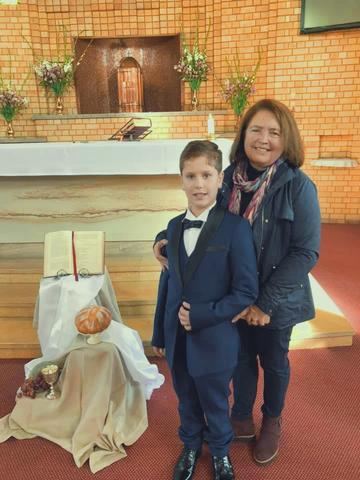
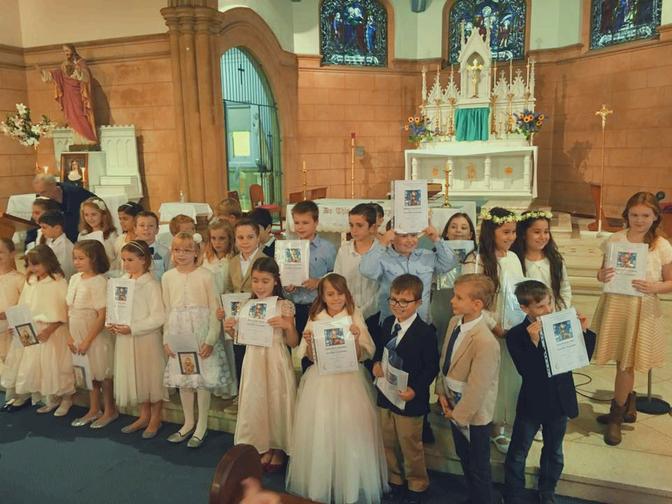

As we explore the richness of the Sacraments in this edition, I invite you to consider how these sacred encounters not only shape our faith, but also our minds and hearts in profound ways
I’m reading a book by a psychologist, and relating it to modern neuroscience They show that prayer and participating in the sacraments, doesn’t only uplift our soul and strengthen our relationship with God - it actually restructures the brain.
When we pray, there is evidence that we engage the same parts of the brain responsible for focus (suppressing distracting thoughts), conscience, emotional regulation (including reducing stress), and purpose Neuroimaging shows parts of the brain that are tied to peace, selftranscendence and hope become activated.
Each sacrament, being a visible sign of grace, is a spiritual practice that transforms us morally (Grace received in the sacraments is not only a gift, but divine help that sanctifies us, transforming our souls, strengthening our freedom and enabling us to live morally in Christ - CCC 1996–2005) and neurologically (It’s a natural consequence of the unity of body and soul - CCC 365)
The Holy Spirit doesn’t just touch our hearts - He renews our minds (Rom 12:2), aligning us with the heart of Christ
As you return to teaching and continue your faithful witness in Term 3 (especially as many of our students prepare for their sacraments), may this edition inspire you anew May it remind you that your ministry not only nurtures faith, but also helps calm anxious hearts, form attentive minds and open souls to the sanctifying grace of Christ

As Catholics, we are called to live sacramentally, not only by receiving the seven sacraments, but by allowing them to shape every part of our lives The sacraments are more than rituals; they are tangible encounters with the grace of God In them, we experience God's presence through signs and symbols Water, oil, bread, wine, words, and gestures, anchoring our faith in the real, the human, the here and now
My favourite way to explain how the sacraments work in us is to imagine an iceberg Above the water a small part of the iceberg is what we can see, feel and touch These are like the signs and symbols. Below the water there is an enormous icy structure that we don’t see, this is God’s grace working in us and the reality of the sacrament.
Interestingly, our culture also craves meaning through signs and symbols. Think of the elaborate celebrations around birthdays and milestones, the growing popularity of wellness rituals, or even the reverence shown to social media “moments” These echo a sacramental instinct It is our deep human longing to connect the visible with the invisible Yet, without God at the centre, these imitations fall short They may be beautiful or moving, but they cannot truly transform us, because they lack the divine grace that only the sacraments bring.
Catechists have the unique privilege of opening children’s eyes to this deeper reality In your weekly lessons, you are not just teaching about sacraments, you are inviting your students into a life where God's grace is real, active, and available
Whether you’re introducing them to Baptism, preparing them for Reconciliation, or explaining the mystery of the Eucharist, you are helping them see the world through the eyes of faith Thank you for the role you play in shaping hearts to recognise the sacred in the everyday

Dear Catechists and Friends,
We all welcome you to Term 3 of 2025! How time flies so quickly - you made it through the first half of the school year and now are embarking on the second half I trust that you are enjoying your lessons with the addition of the Pilgrims of Hope resources in the four-wall corner of your classroom. Watch out: there will be another item which you will receive in connection with the Pilgrims of Hope
We extend our appreciation for those who sent their service award application forms this year As I go through those applications, I can imagine all those years that you willingly gave up your precious time and special gifts to the children in our state schools We have a good number of catechists about to receive a Papal Blessing this year Wow! The first batch of Pope Leo’s Papal Blessings for CCD
As you plant the seeds of faith to the young generation, our hats off to all of you You well deserve our applause May all the blessings be upon you
Sue-Anne Sherwood
NORTHERN BEACHES
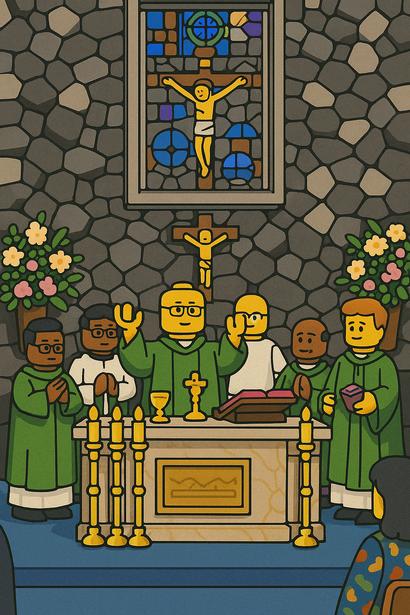

Recently I was working with colleagues from other Christian Churches on a training program for Church Coordinators in Combined SRE Arrangements As some of you would be aware this is how our Protestant friends work together to provide Christian SRE classes which present a single program to Christian children which is not specific to any particular church or denomination
By contrast this training package describes what we do in Catholic SRE as Denominational SRE Denominational SRE closely reflects the definition of SRE provided by the Department of Education:
The beliefs and practices of an approved religious persuasion, delivered by authorised representatives of that persuasion. It is the distinctive religious tenets and beliefs of the home and family, provided by the churches and other religious groups for children of parents expressing the desire that they receive such teaching
Expressed another way, Catholic SRE involves Catechists presenting the teaching of the Catholic Church to children of Catholic families.
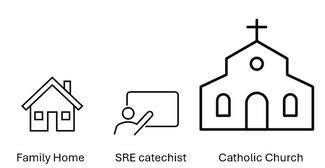
What a privilege this is
Catholic families entrust us to hand on the faith to their children so they may come to know and love Jesus Christ and walk closely with him along pathways of discipleship Done well this religious education of children can reach right back into the home and enliven the faith of the family. So whether it is a unit on Sacraments, Justice or History let’s be mindful that our echo of what we present may be heard far beyond the walls of the public school classroom
John Donnelly

Dear Catechists,
A warm hello to you all, especially those serving so faithfully across the Central Coast I hope you’ve had a restful break and are entering Term 3 with renewed energy and enthusiasm for the important mission you carry

Dear friends,

I hope you are enjoying a restful break in these Winter school holidays and you’re ready for a great term ahead
In this edition of Connections, I’ve written about the spirituality of the catechist, not as something hidden away in the quiet of our inner lives, but something that finds real expression in the ordinary rhythm of our ministry True spirituality isn’t just about prayerful thoughts or personal reflection It’s about showing up. It’s about walking into a classroom, meeting the children where they are, and proclaiming the Gospel in ways they can understand
The Church outlines six characteristics of a catechist’s spirituality: openness to God, to the Church, and to the world; authenticity of life; missionary zeal; and devotion to Mary.
Each of these calls us to live our vocation not just in theory, but in flesh and blood just as Jesus did. Whether it’s your joy, your faithfulness, your creativity, or your quiet witness, each one of you brings something of God’s presence to the children you teach
So as Term 3 begins, I encourage you to ponder: where is God inviting you to grow? Where might the Holy Spirit be nudging you? And how might Mary’s simple words “Do whatever he tells you” guide your steps this term?
Thank you for all you do. Your ministry matters more than you know
Peace and blessings,
Michael Tebbutt
In term 3, we’ll be continuing our Level 1 ‘Tools for the Classroom’ course It’s an optional course with three Zoom sessions and a full-day face-to-face Workshop The Zoom sessions start on Tuesday 22 July, and our Workshops will be held at Chatswood on Monday 18 August and The Entrance on Monday 25 August Even if you’ve done Level 1 before, you might like to do some of these sessions as a refresher Spots are limited so don’t delay if you’re interested.
We’ll also be starting our Level 2 ‘The Church in the 3 Millennium’ course on Zoom on Friday 25 July The course runs for 12 weeks and all Green card catechists are invited to register rd
Due to our Level 1 and Level 2 courses being held in Term 3, we won’t be running a CCD Ministry Induction course, but this will resume in Term 4, so I’ll be in touch with catechists on Yellow cards later in Term 3 to provide details
We hope you are enjoying using the ‘Pilgrims of Hope’ resources with the children in your SRE classes If you need any assistance, please speak with your Parish Coordinator or give us a call
We’ve added more Quizzes to our collection of Powerpoint lessons Click here to access them:
https://www bbcatholic org au/mission/ccd /curriculum/walking-with-jesuspowerpoint/walking-with-jesus-powerpoints
Wishing you all a wonderful Term 3.
Alicia Klein


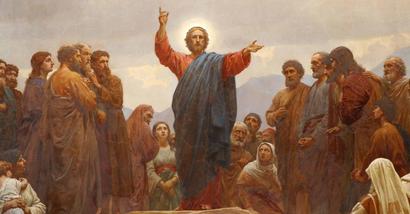
When we talk or think about spirituality, we often think that spirituality is found within. That it has to do with the inner life. Sure, spirituality has to do with the soul but if it is true spirituality it has as much to do with the body as the soul? Can you imagine having the spirituality of the catechist without going into a class or two each week, meeting with the children and proclaiming the Gospel to them in ways that the children can understand?
As catechists we do go into our classes, and we do proclaim the Gospel to the children and help them process the meaning of what we proclaim through various writing, drama, singing and art activities In doing these things each week, we are giving expression to our spirituality as catechists in a real-life manner For spirituality to be genuine, it requires external expression

In The Guide for Catechists (The Office of the Congregation for the Evangelisation of Peoples 1993) there are outlined six characteristics of the spirituality of the catechist. Let us consider each one briefly.
Openness to God. As catechists, we need to be in relationship with the Trinity – Father, Son and Holy Spirit The Trinity itself is a relationship of love The love of the Father for the Son, and the love of the Son for the Father and from this love, is the Holy Spirit who completes this relationship of love As St Augustine said, ‘our hearts are restless, Lord, until they find their rest in You ’ By being open to a relationship with the Father, the Son and the Holy Spirit, we will find rest in our God
What can you do to deepen your openness to the Trinity? Whom do you know who is an example of someone open to God?
Openness to the Church. As catechists, we are the face of both Jesus for the children and the face of our local parish community, the Church. We are not going to them to invite them into a God and me relationship. No we are presenting something much larger than ourselves. We are representing our parish community We are in a God and us relationship and are inviting the children we teach to become part of that community We have a responsibility to teach the children the teachings of the Church, inform them of the Sacramental life of the Church as well as proclaim to them the Good news of Jesus Christ
Reflect on your sense of belonging to your local parish community Is it strong or does it need strengthening? What would strengthen your belonging to the church?
Openness to the World. When we proclaim the Good news of Jesus, let us consider his openness to the world Where was Jesus to be found throughout his ministry? In the countryside and in the towns, dining with religious leading and feeding thousand with five loaves of bread and two fish, walking along the Sea of Galilee and calling the fishermen to follow as well as calling a tax collector who worked in the town Jesus used images of the world in his parables to challenge His listeners to think about what He was teaching. Jesus was open to the world. We too have to be open to the world, especially to the world of the child in the 21 century. We need to use the culture of the child to enable them to grow in relationship with God just as Jesus used the culture of His audience to grow in relationship with the Father.
How do you engage the students in your class?
Recall a religion teacher you had who was open to the world? What can you take from this teacher and emulate in your classes?
Authenticity of life. We need to practice what we preach to the children to be real teachers of the Gospel Do we say one thing but then do another? If we do, our audience will see right through us and we will not be authentic witnesses
As a catechist, do you feel a harmony between what you teach and how you live? If not, what is causing the disharmony?
Missionary Zeal. As a catechist, would you describe yourself as enthusiastic? Does our body language match the joy of the Gospel that we are proclaiming or do we enter the classroom as if we have just attended a funeral?
From Pope Paul VI’s encyclical, Evangelii Nuntiandi (On Evangelization in Our Times) we read:
Here lies the test of truth, the touchstone of evangelization: it is unthinkable that a person should accept the Word and give himself to the kingdom without becoming a person who bears witness to it and proclaims it in his turn (24) As catechists, we must radiate the Good News of the Gospel to be effective catechists
From where does this come? Our relationship with the Father, the Son and the Holy Spirit – our spirituality
Devotion to Mary. Mary is a perfect model for a catechist In the Gospel, there are l moments where Mary ponders on what she has heard At the presentation of Jesus in the temple, she ponders on what Simeon warns her. By pondering events in which we are involved we can see the hand of God at work. Mary’s advice for us was spoken at the Wedding Feast in Cana. She said: “Do whatever he tells you.”
Do we ponder moments in our teaching or in our life experiences where we catch glimpses of God’s action?
As catechists looking to deepen our spirituality, we could do no better that taking Jesus as our guide in our teaching of the children and pondering events in our lives to see the action of the Father as Mary does each time she is mentioned in the Gospel Finally, we must follow the promptings of the Holy Spirit

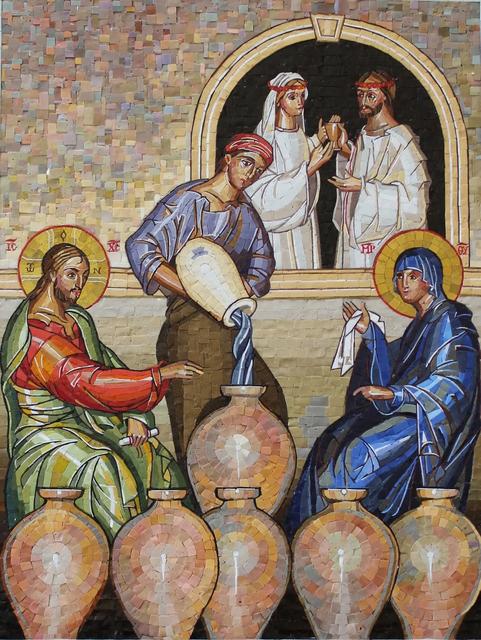
8
What are the seven sacraments?
Baptism
Confirmation Eucharist Holy Orders Matrimony Penance Anointing of the Sick
What is Confirmation?
Confirmation is when we receive the Holy Spirit to help us be strong and live our faith
dna htgnerts ot esoht ohw era ylsuoires lli ro raen htaed
sgnirb s’doG ,gnilaeh ,trofmoc
tnemarcas taht
kciS si eht
gnitnionA fo eht
tahW si eht gnitnionA fo eht ?kciS
tahW si ?ynomirtaM W
a nam dna a namow teg deirram dna esimorp ot evol dna ekat erac fo hcae rehto rof eht tser fo rieht sevil
ynomirtaM ni eht cilohtaC hcruhC si nehw
3 5
Print and fold your Seven Sacraments chatterbox
You can also make it colourful with textas, pencils or crayons
Play in pairs. One person controls the chatterbox, asks the questions, and the other needs to guess what the answers are.
Choose a number and move the chatterbox that many times.
Pick a flap and open it to see a question. Read the question out loud (or ask a friend to help).
Try to answer the question you can look under the flap for the answer!
Take turns and have fun learning about God's special gifts!
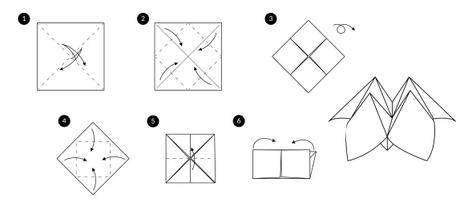
The students might give a more simple response than what is on the chatterbox.

1 Pope Leo shows compassion by helping others What does “compassion” mean?
a) A way to earn money
b) care for someone who is suffering
c) A rule in the church
d) A type of job in the government
2 He is a strong advocate for the poor What does “advocate” mean?
a) A person who supports and speaks for a cause
b) Someone who disagrees with helping others
c) A person who works for the court
d) Someone who gives advice to rich people
3 What is the main idea of the article?
a) Religion is very important in the lives of many people
b) The history of the Roman Catholic Church
c) Pope Leo XIV’s background and how he became the pope
d) Pope Leo XIV is from the South Side of Chicago
4 Which of these statements is false?
a) Pope Leo XIV was born in Chicago
b) He worked as a missionary in Peru
c) He was chosen as a cardinal in 2023.
d) He became pope immediately after graduating high school
5 Why did Pope Leo XIV take the name “Leo XIV”?
a) It was his father’s name
b) He wanted a short name
c) He wanted to honor a peaceful and kind pope
d) It is the name of his favorite saint
Pope Leo XIV was born as Robert Prevost in 1955 in Chicago, Illinois On May 8, 2025, he made history by becoming the first American pope This means he is now the leader of the Roman Catholic Church, which has 1 4 billion followers around the world He took over after Pope Francis and chose the name “Leo XIV” to honor a past pope who showed compassion by helping others
As a young boy, Leo grew up on the South Side of Chicago with two brothers His parents were both educators, and he went to a special high school for boys who wanted to become priests After high school, he studied maths in college and then joined a religious group called the Augustinians, who focus on community, education, and service
After becoming a priest, Leo went to Peru to do missionary work He lived in Peru for many years and later became a citizen of that country Later, he returned to Chicago and took on leadership roles In 2023, Pope Francis chose Bishop Robert to help pick new church leaders around the world That same year, he became a cardinal, which meant he was one of the top church leaders Leo is known for caring about social justice and standing up for people in need He is a strong advocate for the poor and believes in treating everyone with fairness and respect.
Help Pope Leo find his way to St Peter’s Basillica
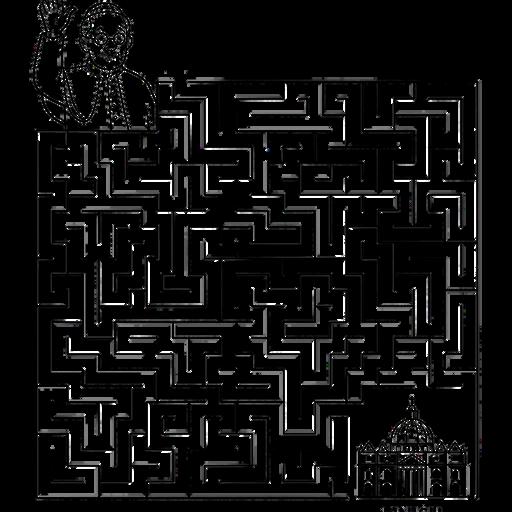
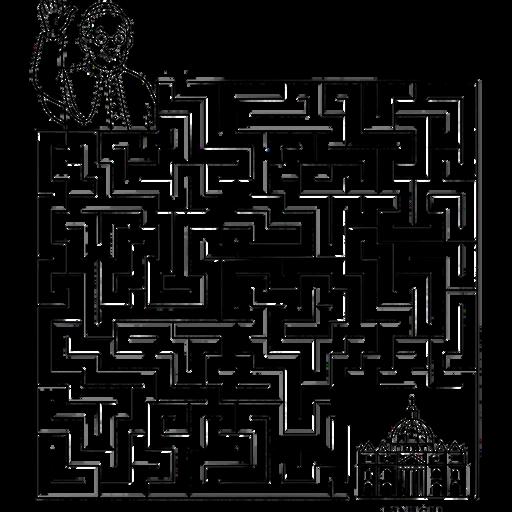
6 What might be difficult for Pope Leo XIV as a leader?
a) Learning to speak English
b) Deciding what to wear each day
c) Deciding which country to live in
d) Talking about sensitive topics in the church

Every student is unique
Use the student’s name
Be flexible
Be positive
Keep things simple
Maintain eye contact
Use clear, simple language

At some point in your ministry as a Catechist, you may find yourself teaching a child with diverse learning needs. This might be a student with a diagnosed disability, a developmental delay, or simply someone who processes the world a little differently. Sometimes, there may be a support person or learning assistant present in the room to help; more often, however, you won’t be told about specific needs in advance. This is not unusual in a school setting. What matters most is your openness to meeting each child where they are, and your willingness to work with the school and classroom teacher to ensure every student can participate meaningfully in their SRE experience
The following tips offer practical ways to create a more inclusive, welcoming space for all learners While no two children are the same, these suggestions can help you feel more prepared and confident Above all, remember that you are not alone - your best first step is always to ask the classroom teacher or school staff for advice about how to support individual students The Department of Education recommends SRE teachers to take direction from the school in these matters With prayerful reflection, a flexible spirit, and a heart for each child, your witness to the Gospel can shine through in every encounter.
Pray before you start your lesson

Try speaking slower (not louder)
Use your normal tone of voice
If you don’t understand what they are saying, say so
Be prepared to use different communication tools, like flashcards e.g. PRAYER TIME or images e.g. a child
praying
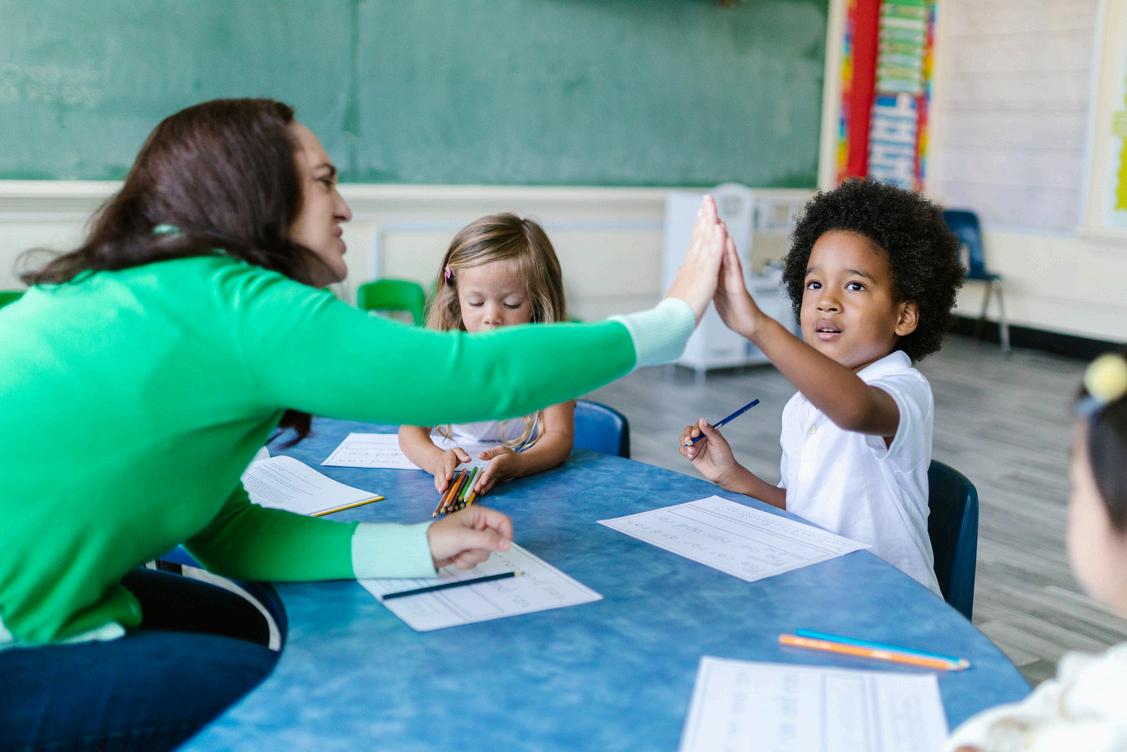
Set expectations (but be flexible)
Allow extra time for the student/s to understand what you have said, and for transitions between activities
Be consistent
Speak directly to the student (even if there is an interpreter or support person with them)
Don’t rush
Guide them
ASK if they need assistance, rather than assume they do
Encourage students
Keep your lesson organised
Outline briefly at the beginning of the lesson what you will be doing today (adding visual cues if relevant)
Provide opportunities for success
Celebrate small accomplishments
Engage with each student’s uniqueness
Treat students with diverse learning needs like every other child
Use common sense
Use a buddy system
Avoid sarcasm or abstract humour Children with some learning needs may interpret language literally Keep jokes simple, and avoid teasing, even when meant playfully
Diverse learning needs are broad – it’s not a one size fits all
Music is a useful tool
Manage your stress – understand it and exercise patience and flexibility
The school is a great resource – ask for help


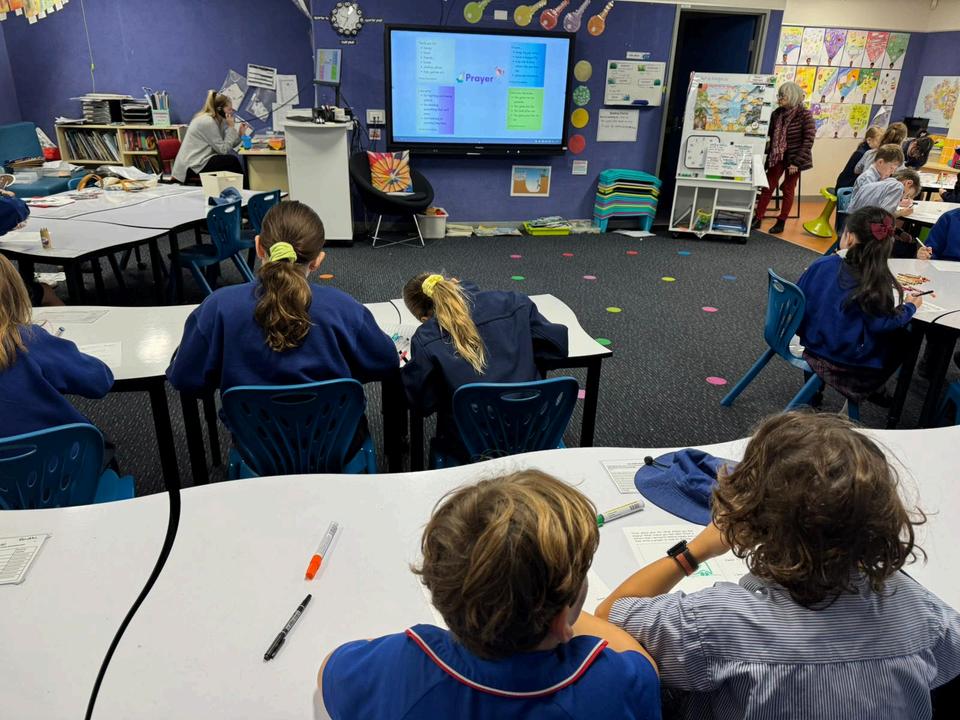


We’re hearing from a lot of Catechists who are using the Pilgrims of Hope resources in their classrooms. As they are moving through the challenges, Catechists are reporting that their students are happily engaging with the tasks that they have been given and there have been many examples of acts of kindness, reflecting on nature and creation and more meaningfully participating in prayer
We’d love to hear even more great stories from your classes as you mark off the challenges with your Luce stickers Email us: ccdadmin@bbcatholic org au with any stories They could be feautured in the next edition of Connections
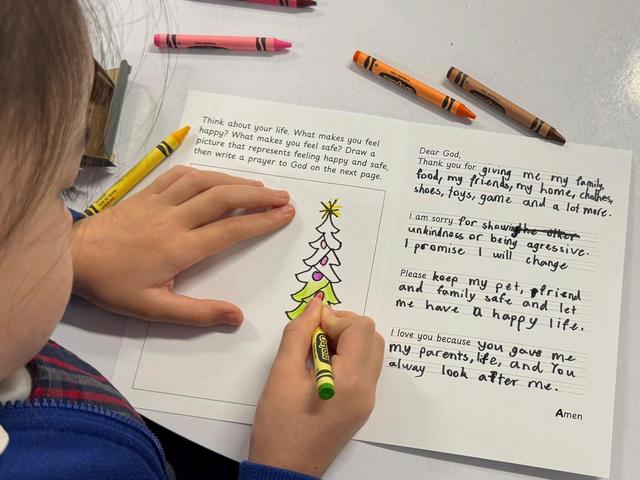

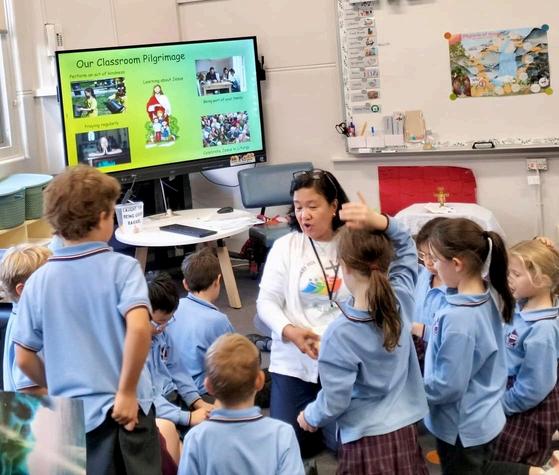

My Sins to a
This was the exact question my daughter once asked She followed up with, “Why can’t I just ask for forgiveness in my prayers?”
Her questions, years after the parish Reconciliation preparation, reminded me that learning deepens through repetition and that young minds often revisit big ideas. This prompted me to reflect on the language to answer these questions.
This is what I told my daughter:
• Of course, you can - and should - ask Jesus for forgiveness in prayer.
• But sometimes, I find myself saying, ‘Please forgive me for my sins,’ generally Then I wake up and go through my day without changing anything in my words or actions.
• When I have to say the words out loud to another person, I must have thought about specific things that I’m asking God’s forgiveness for.
• I need to reflect my past behaviour and acknowledge where I’ve hurt people or made bad decisions.
• When I admit something I’m not proud of out loud, I’m very uncomfortable and it really brings home the fact that I’m not happy with what I’ve done. Therefore I should change this behaviour.
• We heal our relationship with God by asking for his forgiveness, and we heal our relationships with others by apologising and asking forgiveness.
• We receive God’s grace when we receive all Sacraments.
• In the Sacrament of Reconciliation, GOD’S GRACE restores our soul, strengthens our will and helps us resist temptation
• The Sacrament brings peace, freedom, and joy Often, we don’t realise the burden we’re carrying until it’s lifted.
• Feeling nervous before confession is normal - it shows we’re taking it seriously.
• The priest doesn’t judge us. He is so happy seeing us trying to grow closer to God.
• Reconciliation isn’t about what we do. It’s about what JESUS DOES. He forgives, He heals, and He restores.’

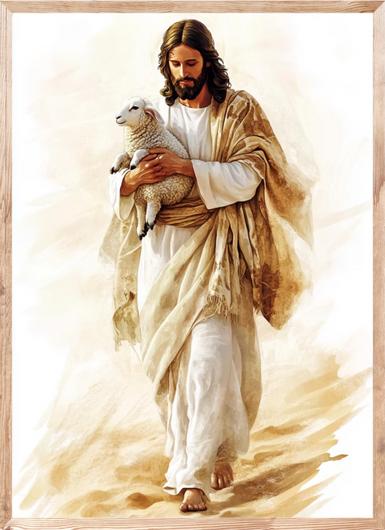
We participate through our repentance, confession, and desire to change We do this because we have reflected, are contrite and accept accountability
At its heart, Reconciliation is about relationships - with God, with others, and with ourselves. It helps us reflect, realign, and become more aware of how we live each day in God’s presence
As Catechists, we remember that while the theology of Reconciliation is rich, our message to children must be simple and full of hope: God is always ready to forgive. Reconciliation means “to walk together again.”
Even if children haven’t committed serious sins, the sacrament helps them grow in holiness, self-awareness and love. This helps form their conscience and deepens their friendship with God.
Children are naturally curious and when it comes to faith, their questions can be surprisingly deep. As Catechists, we are called to welcome those questions with joy and respond in a way that is simple, faithful to Church teaching, and sensitive to the diversity of backgrounds in our classrooms
1. Why do I need to be baptised?
"Baptism is how we become part of God's family. When we're baptised, God fills our hearts with His love and starts us on our journey with Jesus " Be sensitive: Some students may not be baptised Emphasise that baptism is an invitation to God's love and not everyone takes the same journey at the same time.
2. What really happens at Holy Communion?
"At Communion, we receive Jesus Himself The bread and wine become His Body and Blood, even though they still look like bread and wine." Scripture link: "This is my body, given for you " - Luke 22:19
3. Why do I have to go to Reconciliation if God already knows I'm sorry?
"Reconciliation lets us say sorry to God and hear, through the priest, that we are truly forgiven. It gives us peace and a fresh start."
4. Why can't I be confirmed now? I already believe in God. "That's great! Confirmation is when the Holy Spirit strengthens your faith It comes after preparation and choosing to live as a disciple of Jesus "
5. What if someone doesn't believe in the sacraments? "God gives everyone freedom to believe or not The sacraments are gifts Sometimes people grow into belief over time "
TEACHING WITH SENSITIVITY
- Avoid assumptions Not all students are baptised or enrolled in parish sacramental programs. Use inclusive language like "Some of you..." or "Many families "
- Celebrate curiosity Honour every question as a sign of spiritual openness
- Use invitation, not pressure Talk about what God offers, not what students "must do."
WHEN
Sometimes a student's question touches on sensitive topics beyond SRE Be aware of the NSW Department of Education's Controversial Issues in Schools Policy
If unsure, say: "That's a big question-something to talk about with your family or parish priest "
Don't share personal views. Stay within the approved curriculum
Speak to your Parish SRE Coordinator if you're unsure
"Always
be
ready

Choose one question you ' ve been asked by a student about the sacraments Reflect on:
1 What was the student really asking? Was it curiosity, confusion, or personal?
2 How did you respond, or how might you respond differently now?
3. What scripture or Church teaching supports your answer?
4 How can you respond with both truth and gentleness?
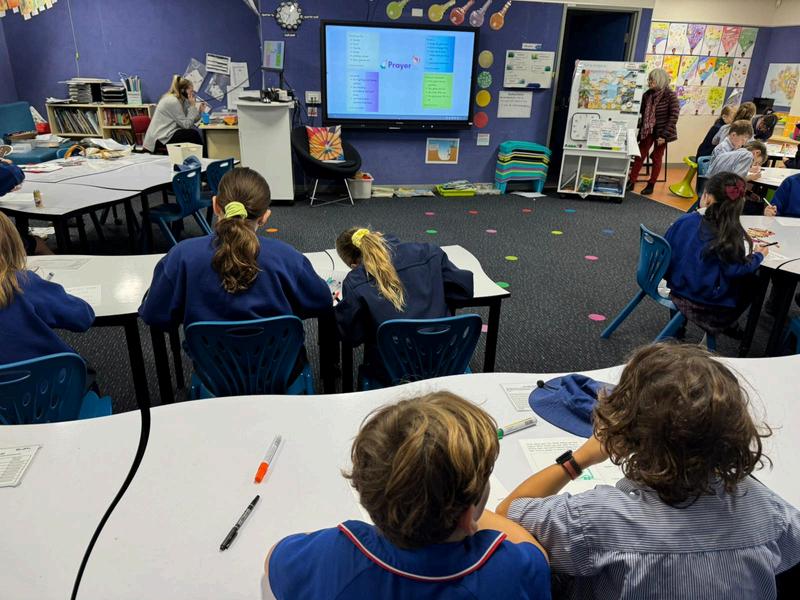
to give an answer to everyone who asks you the reason for the hope that you have, but do this with gentleness and respect " - 1 Peter 3:15


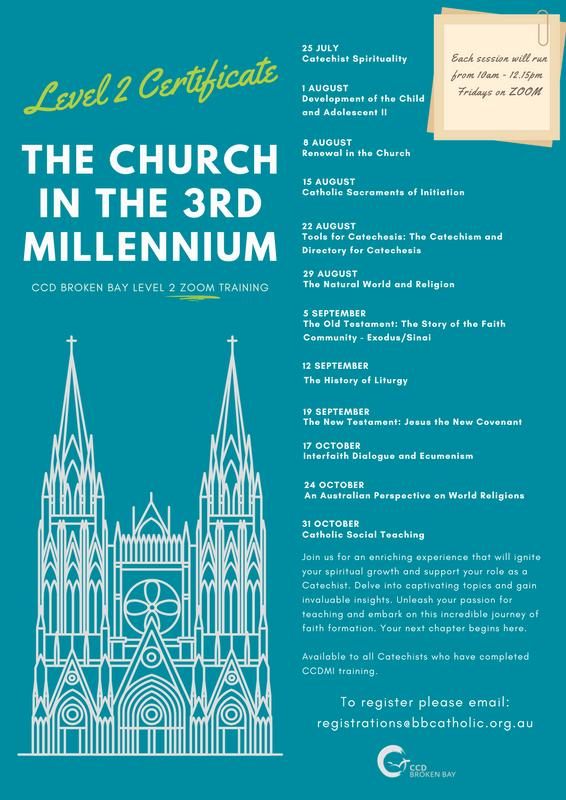
CCD Level 1 'Tools for the Classroom' Course
Our Level 1 ‘Tools for the Classroom’ Course is an optional course that covers the topics ‘Prayer in the Classroom’, ‘Miracles & Parables’, ‘Listening & Questioning’, as well as a practical Workshop ‘Music, Stories and Drama in the Classroom’
We encourage all catechists who have completed their CCD Ministry Induction training to consider joining the Level 1 course Zoom session is July/August and in-person Workshops in August Click the image on the left to open the flyer.
To register, please email registrations@bbcatholic org au or call (02) 8379 1643
CCD Level 2 'The Church in the 3rd Millennium' Course
Our Level 2 course titled ‘The Church in the 3rd Millennium’ commences at the end of July This optional course covers topics:
Catechist Spirituality, Development of the Child and Adolescent II, Renewal in the Church, Catholic Sacraments of Initiation, Tools for Catechesis: The Catechist and the Directory for Catechesis, The Natural World and Religion, The Old Testament: The Story of the Faith Community - Exodus/Sinai, The History of Liturgy, The New Testament: Jesus the New Covenant, Interfaith Dialogue and Ecumenism, An Australian Perspective on World Religions and Catholic Social Teaching.
It runs over 12 Friday mornings on Zoom beginning on 25 July and ending on 31 October All participants who finish the course receive a Level 2 Certificate. We encourage all catechists who have completed their CCD Ministry Induction course to consider joining the Level 2 course
To register, please email registrations@bbcatholic.org.au or call (02) 8379 1643.
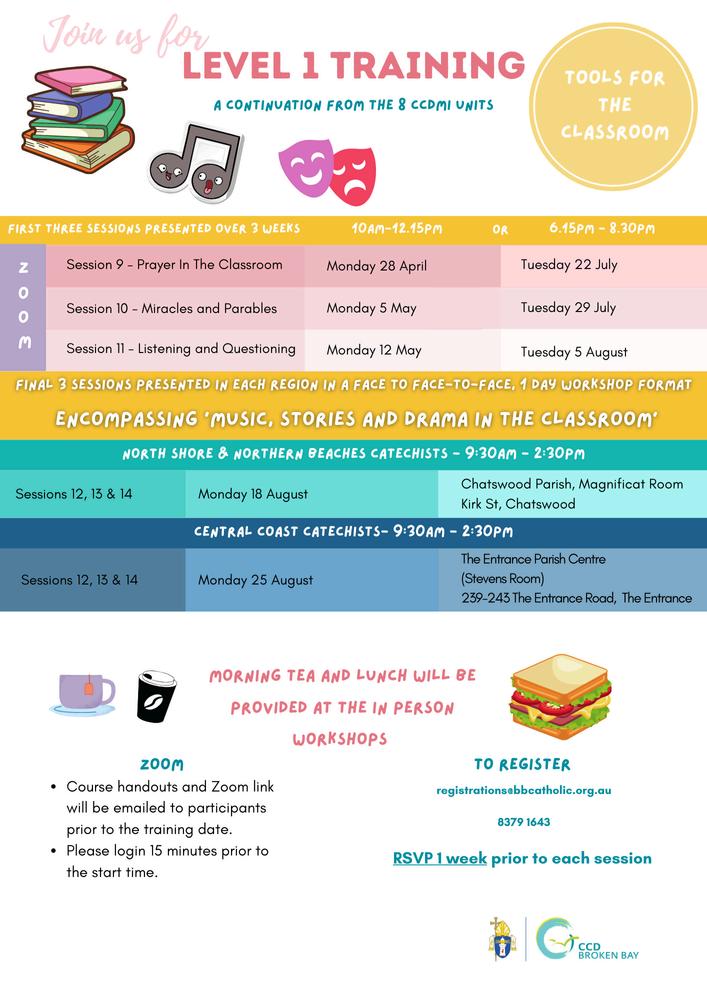

For Catechists seeking to nurture the spiritual lives of their students, understanding how children connect with prayer is paramount. Just as individuals learn in diverse ways, their engagement with prayer can also be deeply influenced by their unique intelligences. Drawing upon Howard Gardner's theory of Multiple Intelligences, let us explore practical and engaging strategies to introduce and deepen prayer experiences for children, recognising that a "one-size-fits-all" approach may not resonate with every learner
1Verbal-linguisticintelligence (wordsmart)
Memoriseanewprayer,prayerjournal,writingaprayer,listeningtoabible storybeingread,tellingtheclassofrandomactofkindness,sharingawritten prayer,participatingwhenaskedtoprayoutloud,letterstoGodaboutthe lesson,teacherleadprayer,readingprayersfromthefrontofthestudent activitybooks
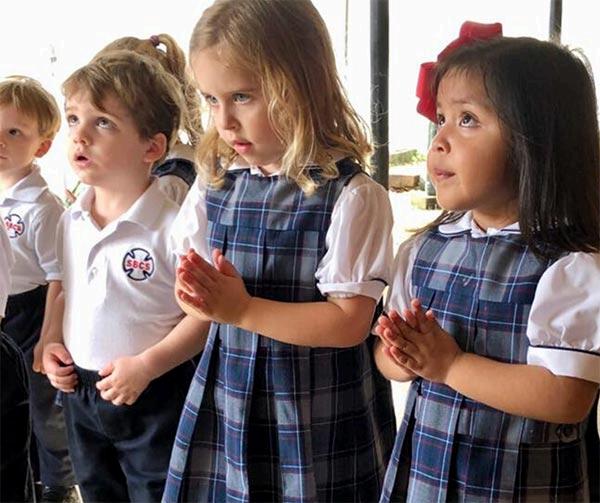
2.Logical-mathematicalintelligence. (numbers/reasoningsmart)
3Spatial-visualintelligence (picturesmart)
4Bodily-kinestheticintelligence (bodysmart)
5Musicalintelligences (music/soundssmart)
6Interpersonalintelligence (peoplesmart)
7.Intrapersonal (selfsmart)
8Naturalistintelligence (naturesmart)
Prayersinwordpuzzles,Rosarybeads,mandalas,enlargethewordsofegHail Mary,cutsentencesupforstudentstoputbacktogetherlikeapuzzleand findtheirorder
Createartwork,colourinwhilelisteningtoprayer,song,biblestory,watching videoofbiblestory,Mandala,Photolanguage
Songactions,mimeprayer,NativityPlay,dramatisationofbiblestory,Pope Francis'FiveFingerPrayer,prayerinsignlanguage,useasacredspaceobject andpassaround(couldbeinsong),actionstotraditionalprayer
Songs,hymns,sounds(meditationwater,birds,wind)
Intercessionprayersforneedsofothers,prayerpartners,classdiscussions, groupwork,listeningskills
Prayerbox(Easter/Christmas/Massofferings)forintentions,Mandala,Lectio DivinamethodsofstudyingScripture,guidedmeditations,meditation,quiet prayercornerortime
Creation,outdoorwalkaroundprayers,quietplaceoutsidetoreadactivity bookreading/answerquestionsinbook

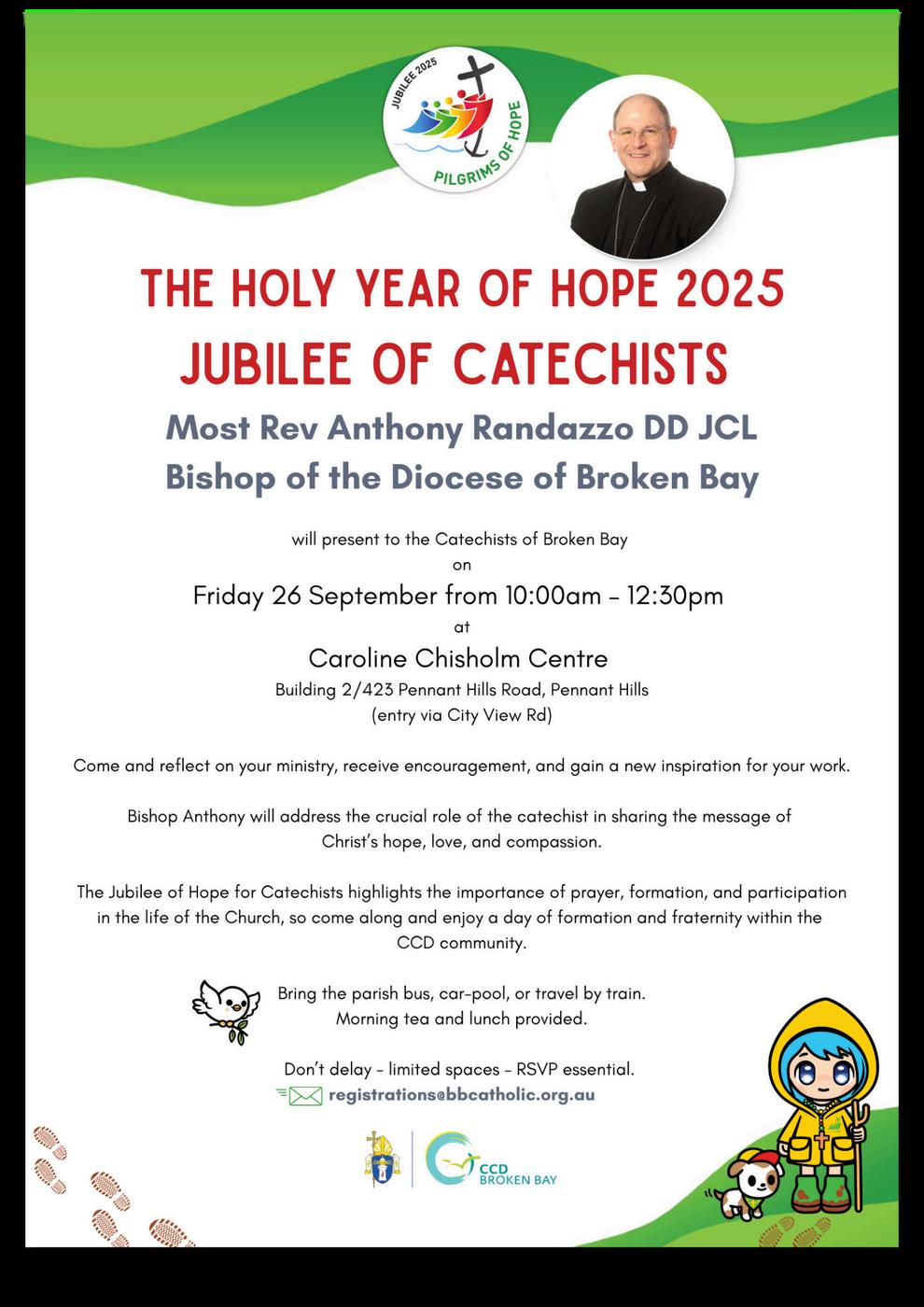
P O P E L E O X I V F I N D - A - W O R D
S O L U T I O N